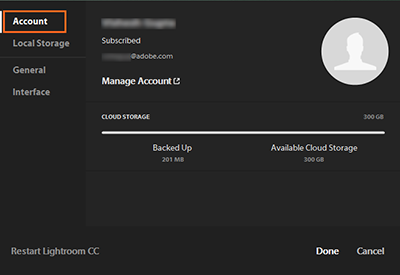Organize, touch up, and share your photographed world with Adobe Lightroom.
Whether you’re a wedding photographer or an Instagram power user, anyone that cares to manage and brush up hundreds of photos ought to give Adobe Lightroom a whirl. A relative newcomer to the Adobe suite of products, Lightroom focuses on the breadth part of the photo manipulation equation where the venerable Photoshop has eyes on depth. Lightroom is like the workshop for your photography hobby: spread your photos out on the table, organize them into albums, apply star ratings for favorites or flag them for acceptance/rejection, and apply light touches and corrections at scale. You can’t do invasive surgery on photos with Lightroom like you can Photoshop, but it’s meant to serve a much different purpose at a higher altitude. It does so with ease and Lightroom always retains the original photo.
Lightroom on the web is an online tool that allows you to edit, crop, make adjustments, and apply presets to your photos. Adobe Lightroom is an image-organizing and editing application. It is different to Adobe Photoshop for a number of reasons, although the two programs do share some features. If you'd like to know what Adobe Lightroom is used for, let's take an in-depth look at what it's all about. What's new in this version. Version 4.3 With this release we are excited to launch new features including our Premium presets, Super resolution, Collaborative editing, Color grading tutorial support, and Author blocking Premium Presets: Lightroom is introducing over 70 new, hand-crafted Premium Presets directly in the app, that will help you achieve yocreative vision.
Adobe Photoshop Lightroom is a free, powerful photo editor and camera app that empowers your photography, helping you capture and edit stunning images. Easy image editing tools like sliders and filters for pictures simplify photo editing. Retouch full-resolution photos, apply photo filters, or start photo editing wherever you are. What are cookies and why does Adobe use them? Cookies are small text files stored by your web browser when you use websites. There are also other technologies that can be used for similar purposes like HTML5 Local Storage and local shared objects, web beacons, and embedded scripts. These technologies help us do things like remembering you.
The UI is icon heavy and easy to grasp, the tiling of photos makes it much simpler to work on multiple images at a time, and the toolset doesn’t overwhelm the average user like Photoshop can. Lightroom photos can sync up and share directly to your Adobe Portfolio where you can build a photography website in minutes. It’s all cloud based. Tutorials could use an improvement by being integrated into the program itself as they currently they exist in video format only. Still, Lightroom plays well at its specific role in the Adobe suite of products and should appeal to any photography buff wanting to wrangle their ever-growing collection.
Adobe’s free trial makes it a simple task try out the light touches and photo management features of their Lightroom app

Easy and effective tool to handle any photographer’s organizational needs using Adobe’s cloud.
When digital cameras and smartphones first came on the scene, you had to be cognizant of the photos you took because of storage limitations. You could only fill up that SD card with a couple hundred hi-res shots before another trip to the electronics store for a second. Now with the advent of cloud storage and huge solid state memory drives we find ourselves at an interesting crossroads of efficiency: as something becomes more efficient we tend to use more of it. This holds true for photography now. Storage is so cheap and plentiful that it’s a mindless task to take hundreds of photos that have a tendency to sit on our phones or up in the cloud begging to be organized. Lightroom accepts that challenge. It’s Adobe’s answer to an organizational demand from our ever-increasing photo supply.
Curious users can give it a shot using a 7 day free trial. You’ll need a payment method handy which Adobe will automatically charge once the trials end. It’d be nice to download it without that stipulation. Make sure you cancel in time if you don’t want to get charged.
Once you’re up and running using the Adobe Creative Cloud platform, from which you can start Lightroom, the program immediately asks you to add some photos. Throughout the review there will be parallels to Photoshop and this is the first sign that Lightroom plays a much different role. In Photoshop you can create images on blank canvases. Lightroom takes a photo-first approach, 'give us your raw images and let’s get to work.' You can select from a connected device (camera, memory card, phone), browse from your PC, or sync from Lightroom on Android or iOS.
First impression is that Lightroom desperately needs a hands-on tutorial. It’s unclear as to what exactly Lightroom can do. Tutorials do exist but they’re buried under the Help button which links to a set of videos but nothing in the application itself. It begs you to have a dual monitor setup to follow along. Imagine a video game tutorial that happens outside of the game.
Let’s look at the UI and go over the two high level tools: Organizing and Editing.
The organization tools live on the left-hand side of the screen and on the bar above your photo, taking up the most real estate of any other toolset. There are three options on the left: Add Photos, My Library, and Sharing. Add Photos lets you add a photo to your workspace. My Library gives you filters to select certain albums, recent photos, etc. Sharing lets you upload photos to your Adobe Portfolio.
Folder marker pro 4.2 registration key. The real power of organization is delivered by way of star ratings and tagging. Star ratings work like a review system of 1-5 stars per photo. Tagging options include type, keyword, camera, location, people, and contributors. In that sense, you can create traditional albums but then cross-reference select photos by their stars and tags, which adds to the notion that Lightroom excels for people who have big libraries.
The editing tools populate the right-hand side of the screen.
- Edit lets you apply differing levels of light, color, effects, details, optics, and geometry.
- Crop is simple and lets you crop, rotate, or flip an image.
- The healing brush is more advanced and allows you to blend imperfections into the surrounding image.
- The brush tool lets you add strokes of brightness, darkness, contrast, tints, and other effects to the image. It isn’t like a paintbrush tool that crudely draws color over the pixels, but a touch up tool that sort of reimagines the pixels underneath.
- Gradients can be added as overlays of differing color to the image. For example, if you have a photo with the sun in the corner and want to add artificial sunshine that washes over the whole image, you could use the gradient tool to simulate an increasing brightness from the sun source.
Given these tools, it’s clear that Adobe wanted to keep Lightroom a simpler product aimed at higher level functions, where breadth takes precedent over depth.
Adobe Lightroom Serial Number
Where can you run this program?
Lightroom works on macOS and Windows for desktop versions and also has an iOS and Android app. The desktop and mobile versions can sync together.
Is there a better alternative?
For casual users in the iOS environment you can likely get what you need from Apple Photos. However, the organization features only work within Apple Photos and Lightroom has better editing features. Other strong options include Skylum Luminar, Corel AfterShot Pro, and Zoner Photo Studio X, all of which look and feel similar to Lightroom and share many of the same features. However, if you use Photoshop, Lightroom gets a leg up being part of the Adobe family for syncing purposes.
Our take
Lightroom is the best-in-class app for modern photography organization. So if you take lots of photos, want multiple options for how to manage them, need intuitive editing tools, and the safety of cloud storage, then you shouldn’t look much further. There is extra incentive if you’re already on the Adobe cloud and use Photoshop. Pricing and the subscription model may turn some users off, but Adobe does photography right, and continues to stay at the forefront of valuable apps for camera aficionados.
Should you download it?
The free trial gives you 7 days to decide whether to stick with Lightroom and can be canceled at any time, so if the use cases described throughout this review appeal to you, there is no risk to give it a shot. Manually install catalina.
Highs
- Lightning fast gameplay
- Short mission duration
- Oceanic depth
- Helpful community
- Free to play without pay-to-win
Adobe Lightroom Shortcut Keys
Lows

- Overwhelming to start
- Requires outside help
- Grind
Adobe Lightroom Subscription
Adobe Photoshop Lightroomfor Windows
Adobe Lightroom Sepia
2021.10.2